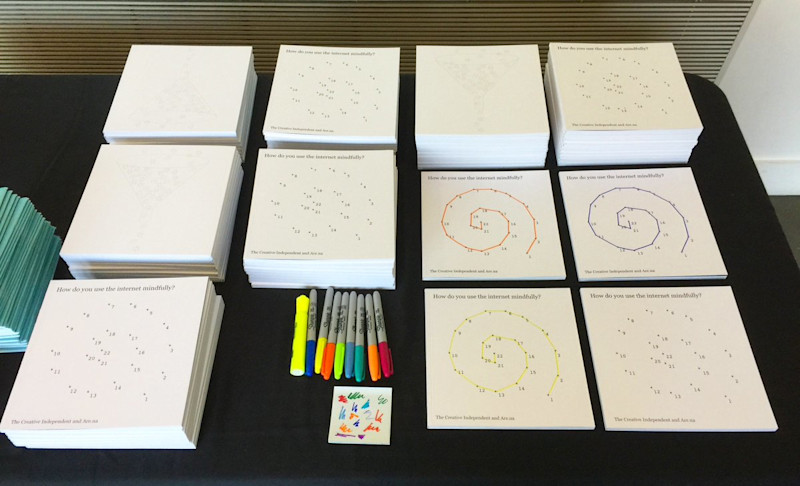Hello World
How do you use the internet mindfully?
11/7/2018
Leo Shaw

We recently printed a book in collaboration with The Creative Independent, called How do you use the internet mindfully? It collects a series of essays by artists grappling with the web as both a creative medium and an engine of information overload. You can download it here for free and enjoy it offline. Below is our introduction, on manifesting the web we want.
This summer we got to watch a workshop created by a few friends that used colorful cardboard blocks to imagine the internet as a city <small><a name="hi">1<span>The Internet as a City workshop was created by a group of students and educators at MIT.</span></a></small>. Together they built structures that represented different ways of organizing the infrastructure of the web. “If the Internet were a city,” they asked, “what would be its roads, buildings, and parks?”
We like this metaphor because it helps us talk about technology beyond the scope of individual features and technical problem-solving. Instead, it presses us to draw qualitatively on our relationship to the world around us for inspiration. Maybe you would prefer to live in a city with plentiful parks, efficient transportation, and affordable neighborhoods. Maybe you’d like to get rid of incessant advertisement and surveillance cameras. By picturing the ways that those features demonstrate our values— common access to public space, a meaningful right to individual privacy, and so on—we can think expansively about how to manifest those values on the web.
Even though the internet suffers from the same problems that affect cities, it’s not always easy to see the internet as a field of action. Its workings can feel opaque and intangible to non-engineers. Even programmers have to contend with a culture and a market that encourage a fairly narrow range of creative outputs. Describing the web in different terms can help us see beyond the current landscape of dominant platforms, and aim for a more meaningful model of online social life.
Artists and creative technologists can help us consider the internet in ways the technology industry still struggles to see it: as a place where people relate to one another emotionally, or generate knowledge together, or create safe and supportive communities for common use. More often, companies are under pressure to understand their missions as a set of growth metrics, and then push those numbers up exponentially. But the design critic and philosopher Joe Edelman posed an important question when he asked, “is anything worth maximizing?” If we’re sensitive to the expressive qualities of the web as a creative medium, we can create tools that fully empower the people who use them.
The good news is that changing the status quo online is easier than transforming the physical fabric of our cities. The solutions to our problems with the web are more cultural than they are technical, financial, or political. If we can popularize a broader vision of how we want to be together online, we can channel a tremendous amount of energy towards creating more cooperative spaces.
In her essay, On how to grow an idea (which you can read on page 17), artist Jenny Odell writes that “ideas are not products, as much as corporations would like them to be. Ideas are intersections between ourselves and something else, whether that’s a book, a conversation with a friend, or the subtle suggestion of a tree. Ideas can literally arise out of clouds (if we are looking at them). That is to say: ideas, like consciousness itself, are emergent properties, and thinking might be more participation than it is production.”
The participation she describes is something we have all experienced at one point or another on the web. Discovering a beautiful homepage, finding another person with similar interests, or stumbling onto a whole field of knowledge you didn’t know existed—all these experiences help us to deepen our view of the world. Each encounter with the sprawling, extravagant intelligence of the human network is revelatory in its own way.
The essays in this book offer theories and strategies that creative people can use to find more of these moments in the course of their projects. Each one also offers its own vision of a world we have the opportunity to make together. We hope they inspire you to navigate the web in ways that fully express the joy and dignity of the medium.
Are.na Blog
Learn about how people use Are.na to do work and pursue personal projects through case studies, interviews, and highlights.
See MoreYou can also get our blog posts via email